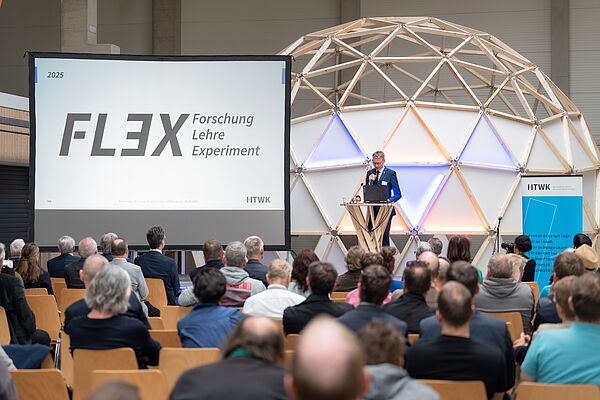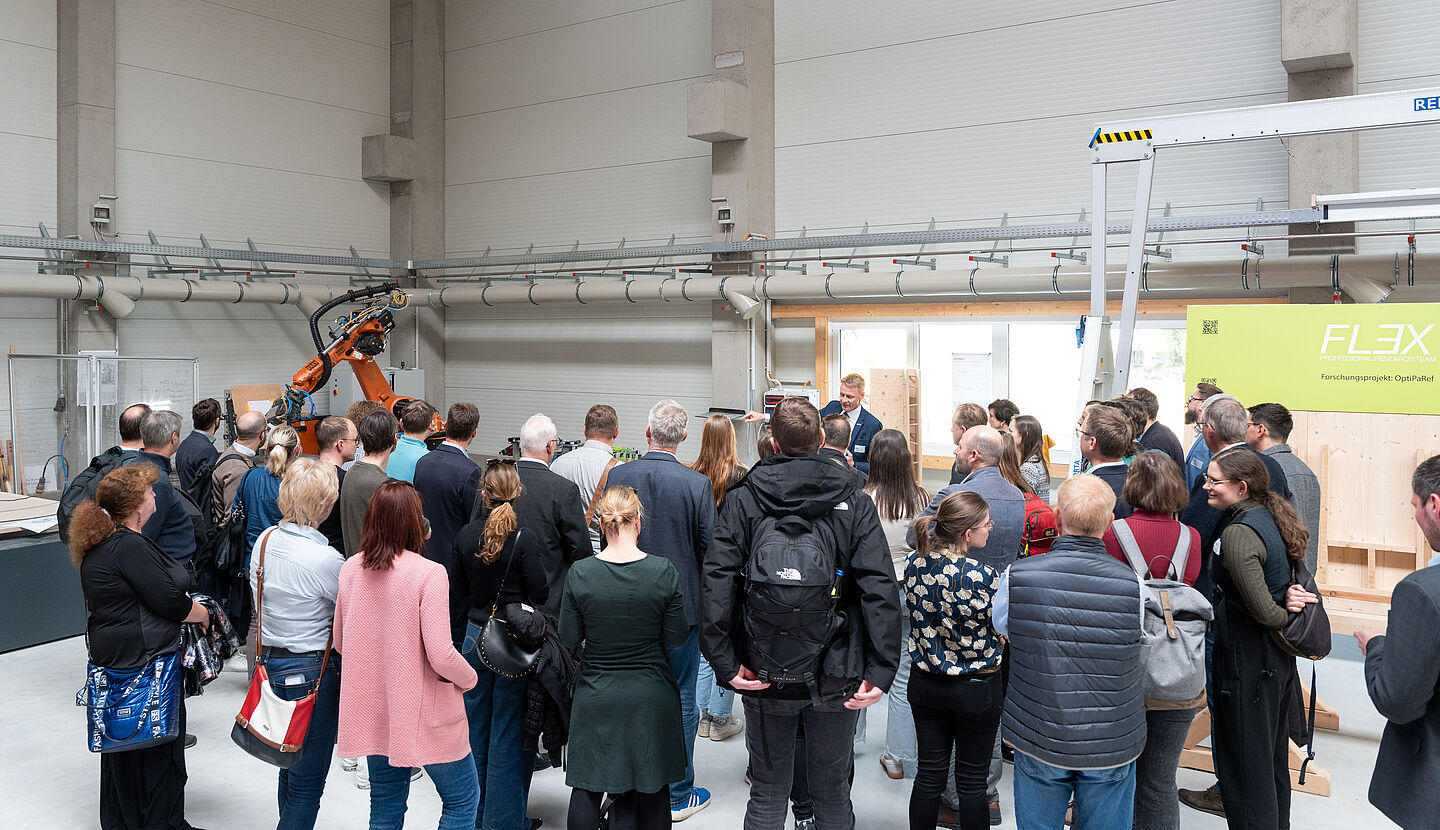The FLEX research group celebrated with 250 guests from business, science and politics at the HTWK Leipzig's HolzBauForschungsZentrum today
A decade of applied research was the occasion for today's anniversary celebration of the FLEX research group at Leipzig University of Applied Sciences (HTWK Leipzig). "We started as the interdisciplinary research group FLEX just over ten years ago to give new impetus to applied research in the field of digital manufacturing in the construction industry," said Alexander Stahr, Professor of Structural Engineering at HTWK Leipzig and founder of FLEX, in his opening speech. He continued: "From the very beginning, it was our goal to cooperate with companies from industry on the basis of innovative strength, high standards and reliability, as well as to show ambitious students of Architecture, Civil and Industrial Engineering exciting prospects in an equally exciting field of activity."
For more than ten years, Stahr has been developing strategies for individualised, automated production concepts in timber construction with the interdisciplinary research group FLEX (Forschung.Lehre.Experiment). It all began with research into the Zollinger roof, a particularly material-efficient roof construction method with curved timbers, which FLEX was able to give a new perspective thanks to digitalisation and further development. This led to numerous other innovative timber construction projects. The most recent milestone was the opening of the HolzBauForschungsZentrum at HTWK Leipzig in Leipzig-Engelsdorf in August 2024. In this research and production hall, which is unique in terms of its technological equipment, Stahr and his team from Architecture and Engineering will be able to develop and test new concepts for material-saving solutions on a real scale and at application level. In this way, the FLEX research group aims to fulfil its claim of conducting cutting-edge, application-oriented research.
Accompanying specialist programme and hands-on research
In order to give around 250 guests from business, science, politics and society an insight into this applied research area, a wide-ranging programme of lectures on digitally based concepts for the resource-saving, recyclable construction of tomorrow followed at HTWK Leipzig.for Process Automation and Embedded Systems spoke about on "Digital Concrete" and Prof. Dr Ingo Reinhold from iP³ Leipzig, the Institute for Printing, Processing and Packaging Leipzig, on additive manufacturing. This was followed by presentations from the FLEX research group on robotics in timber construction, the use of artificial intelligence and the potential of end-to-end digital value chains.
The research was made visible in practice during tours of the HolzBauForschungsZentrum and at stations within the hall. There was an industrial robot equipped with a pen that drew portraits of visitors as well as a collaborative robot ("Cobot") and a "LEGO robot" in action. In addition, guests were able to see the "building instructions" for a wooden stud wall through mixed reality glasses and assemble an elemental 3D-printed model of the enhanced Zollinger roof themselves. They were able to marvel at how "double-layer wood veneers" deform under the influence of changing humidity in order to shade rooms in future as "naturally controlled", individually replaceable shading slats and reduce air conditioning costs.
Future pilot Thomas Strobel on the construction sector of the future
Another highlight was the keynote speech by Thomas Strobel, Managing Director of the management consultancy Fenwis. In his role as a "future pilot", he took a look at the construction sector of the future with his speech "Innovation Roadmap 2050". In doing so, he drew a line between important framework conditions for a vision of the future in 2050, successful approaches to planning for the future and the transformations that will be necessary over the next 25 years. From an opportunity-orientated perspective, he looked at successful practical examples of the circular economy as well as new requirements and success factors in the construction sector. He enriched his keynote speech with impulses for pragmatic ideas for the future and interdisciplinary, cross-industry exchange so that training concepts and funding programmes can also be geared towards future needs.
Outlook: FLEX reinvents itself
Finally, Stahr gave an outlook on the plans and development of the FLEX research group. "We are delighted that we are in the process of founding our own institute. This will be the next step in signalling to our partners: We still have a lot planned! Innovation and reliability are the pillars of our long-term strategy."
Background to "Research meets ..." and the Dissertation Prize 2024
The anniversary celebration took place as part of the networking event "Research meets ...", at which HTWK Leipzig invites employees, researchers and guests once a year to get to know university locations and the laboratories and research projects based there. Two of the largest and newest research and production halls are located on the Weigelstraße research campus in Leipzig-Engelsdorf in the Leipzig/Saxony Construction Technology Innovation Park: The HolzBauForschungsZentrum and the Carbon Concrete Technology Centre. Two places where innovations for building the future with wood and carbon concrete are created - on a real scale.
At the event today, the HTWK Foundation also awarded the Dissertation Prize 2024, with which it annually honours outstanding doctoral theses with a high degree of practical relevance. This year, the foundation honoured Dr Christoph Oefner: the mechanical engineer dealt with the clinical problem of implant loosening in patients with osteoporosis. He developed a digital prediction model to quantitatively estimate the service life of anchors with pedicle screws and accepted the prize during the award ceremony.

